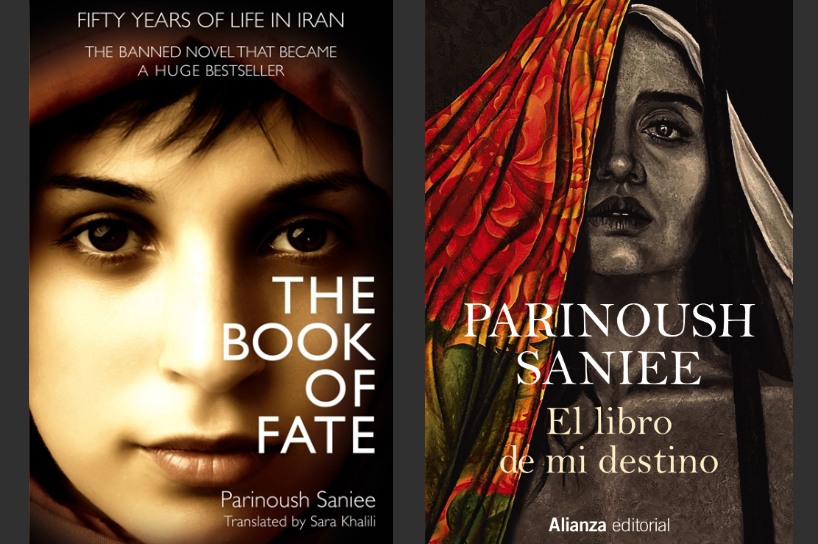A while ago, a friend asked me to recommend a few works of Persian literature that have been translated into English. This request led me to search for some during these hot, dull, and somewhat sad days in Athens. Unfortunately, the list isn’t long, but valuable works can be found, especially from Iranian women writers. These writers focus on the themes of women’s resistance and struggle in Iran.
One particularly valuable work is “The Book of Fate” by Parinoush Saniee. This novel is a contemporary history of Iran, depicting social relations from the 1970s to the present day, while narrating the forbidden love of a woman in a traditional and religious society.
The story begins with the life of Massoumeh, a teenage girl who has recently moved to Tehran with her family. It describes a woman who embarrasses her father by laughing loudly in the street or not wearing a chador, yet has an uncle who defends her and urges her family to understand the changing world.
Massoumeh, a successful student, is keen to continue her education against her family’s wishes. During this time, she meets Saeed, a young man working at a nearby pharmacy, and falls in love with him. However, when her younger brother discovers this relationship, her parents and brothers beat her and even imprison her at home for simply falling in love. Massoumeh’s life path changes as she is forced to abandon her education and eventually marry a man she doesn’t know.
The story introduces us to various realities of Massoumeh’s life. On her wedding day, she sits beside a “stranger” she has never met. On her wedding night, panicked at the thought of being rape, but her husband Hamid, leaves her alone. Massoumeh spends the first days of her marriage in the house of a “stranger,” lonely and dreaming of Saeed and her books. Later, she discovers that Hamid was also forced into the marriage.
Massoumeh’s life enters a new phase. She gets the chance to continue her education, and unlike others, her husband doesn’t control her; he is different from the men she has known, making her happy. Hamid spends more time with his friends, absorbed in reading and writing. Massoumeh eventually learns that Hamid is a leftist political activist and an opponent of the Shah.
The story takes us through the twists and turns of Massoumeh’s life. She becomes pregnant twice, and her husband is arrested by SAVAK and imprisoned for 15 years. She raises their two children alone while continuing her university studies. During the 1979 revolution, her brothers join Islamist political groups, especially Hezbollah. At the peak of the revolution, Hamid is released due to popular resistance and resumes his activities, but Massoumeh’s brothers ostracize him for being a communist and not believing in Islam and God, even supporting his execution. Less than a year later, Hamid is arrested again and, despite Massoumeh’s and her father’s efforts, he is executed.
Her suffering ramps up and Massoumeh’s complex life spans several decades. After thirty-three years, she finds her first love, Saeed, bringing happiness back into her life. However, she seems unable to fully embrace this happiness, allowing others, often her close ones, to take it away.
As a teenager, Massoumeh couldn’t stand up to her religious, backward, and brutal brothers. Now, nearing fifty, she lets her children decide that she has no right to remarry for the sake of their honor. It seems love and life are only for the young. Those with children and grandchildren must play dead, waiting for their turn to die. What a backward, inhumane culture! Massoumeh, under pressure from her children, sacrifices her love for a second time.
This is an extremely moving and powerful tale of women in Iran, beginning before the revolution of 1979 through the Islamic Republic to the present. Spanning five decades it tells the story of the changing fortunes of one family and in particular of Massoumeh, the daughter. Through the highs and lows, having children and finding work (and losing it again because of political change), the changing attitudes in Iran are vividly depicted through the characters. This is a window on recent Iranian history untainted by ‘western interpretation’ making it that much more fascinating and revealing.It is a story of strong women fighting for what they want against huge odds, a story of friendship and passion, of religious oppression but also of love for the country.
The novel offers short, captivating narratives of Massoumeh’s life and various aspects of Iranian society. Published in Tehran in 2003, despite being censored and banned twice, it remained a bestseller in Iran’s book market for nearly 15 years. The book was published during the Reform Era, a period when women’s rights became a central issue in Iran, driven by the rise of social movements.
If you are interested in Persian literature, this is an excellent novel. Saniee gives a voice to all the Iranian women who are victims and prisoners of domestic violence, tradition and men’s abuses… Saniee’s women are contemporary heroines who fight to obtain civil rights even if that can cost them their lives.








